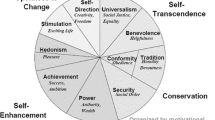Abstract
Recent events suggest people are increasingly concerned not just with their own well-being but that of animals as well. However, there is little systematic evidence on people’s willingness-to-trade their own well-being and quality of life for improvements in the well-being of farm animals. In this paper, we utilize a straightforward and unobtrusive technique to mitigate socially desirability effects and gage the publics’ opinion about farm animal welfare: indirect questioning. In survey of United States households, we find sharp differences between direct and indirect questions related to farm animal welfare. For example, whereas only 15.6% of the public said they think low meat prices are more important than the well-being of farm animals, 67.5% said the average American thinks low meat prices are more important than the well-being of farm animals. This finding, coupled with the extant literature on indirect questioning, suggests that people’s concerns for farm animal welfare are actually much lower than what they say they are.
Similar content being viewed by others
Notes
People were also permitted to respond with “I don’t know.”
References
Broom, D. M., & Johnson, K. G. (1993). Stress and animal welfare. Dordrecht, The Netherlands: Kluwer.
Chung, J., & Monroe, G. S. (2003). Exploring social desirability bias. Journal of Business Ethics, 44, 291–302. doi:10.1023/A:1023648703356.
Cohen, J. F., Pant, L. W., & Sharp, D. J. (2001). An examination of differences in ethical decision-making between Canadian business students and accounting professionals. Journal of Business Ethics, 30, 319–336. doi:10.1023/A:1010745425675.
Crowne, D. P., & Marlowe, D. (1960). A new scale of social desirability independent of psychopathalogy. Journal of Consulting Psychology, 24, 349–350. doi:10.1037/h0047358.
Diener, E., & Biswas-Diener, R. (2002). Will money increase subjective well-being? Social Indicators Research, 57, 119–169. doi:10.1023/A:1014411319119.
Epley, N., & Dunning, D. (2000). Feeling ‘holier than thou’: Are self-serving assessments produced by errors in self- or social prediction? Journal of Personality and Social Psychology, 79, 861–875. doi:10.1037/0022-3514.79.6.861.
Farm Foundation (2006). Future of animal agriculture in North America. Oak Brook, IL: Farm Foundation. Available online at (Last accessed 8/17/07): http://www.farmfoundation.org/projects/documents/AnimalWelfare_000.pdf.
Fields, J.M., & Schuman, H. (1976–1977). Public beliefs about the beliefs of the public. Public Opinion Quarterly, 40, 427–448. doi:10.1086/268330.
Fisher, R. J. (1993). Social desirability bias and the validity of indirect questioning. The Journal of Consumer Research, 20, 303–315. doi:10.1086/209351.
Fisher, R. J., & Katz, J. E. (2000). Social-desirability bias and the validity of self-reported values. Psychology and Marketing, 17, 105–120. doi:10.1002/(SICI)1520-6793(200002)17:2<105::AID-MAR3>3.0.CO;2-9.
Greene, W. H. (2000). Econometric analysis (4th ed.). Upper Saddle River, NJ: Prentice Hall.
Herbert, J. R., Clemow, L., Pbert, L., Ockene, I. S., & Ockene, J. K. (1995). Social desirability bias in dietary self-report may compromise the validity of dietary intake measures. International Journal of Epidemiology, 24, 389–398. doi:10.1093/ije/24.2.389.
Herbert, J. R., Ma, Y., Clemow, L., Ockene, I., Saperia, G., Stanek, E. J., et al. (1997). Gender differences in social desirability and social approval bias in dietary self-report. American Journal of Epidemiology, 146, 1046–1055.
Hoffman, E., McCabe, K., Shachat, K., & Smith, V. (1996). Social distance and other-regarding behavior in dictator games. The American Economic Review, 86, 653–660.
Huppert, F. A., Marks, N., Clark, A. E., Siegrist, J., Stutzer, A., Vittersø, J., & Wahrendorf, M. (2009). Measuring well-being across Europe: Description of the ESS well-being module and preliminary findings. Social Indicators Research, 91, 301–315. doi:10.1007/s11205-008-9346-0.
Johansson-Stenman, O., & Martinsson, P. (2006). Honestly, what are you driving a BMW? Journal of Economic Behavior & Organization, 60, 129–146. doi:10.1016/j.jebo.2004.08.006.
Lusk, J. L., & Norwood, F. B. (2009a). An inferred valuation method. Land Economics, (forthcoming).
Lusk, J. L., & Norwood, F. B. (2009b). Bridging the gap between laboratory experiments and naturally occurring markets: An inferred valuation method. Journal of Environmental Economics and Management. doi:10.1016/j.jeem.2008.12.003.
Maccoby, E. E., & Maccoby, N. (1954). The interview: A tool of social science. In G. Lindzey (Ed.), Handbook of social psychology (pp. 449–487). Cambridge, MA: Addison-Wesley.
Pronin, E. (2006). Perception and misperception of bias in human judgment. Trends in Cognitive Sciences, 11, 37–43. doi:10.1016/j.tics.2006.11.001.
Reagan, T. (2004). The case of animal rights. Berkeley, CA: University of California Press.
Ross, L., Greene, D., & House, P. (1977). The ‘false consensus effect’: An egocentric bias in social perception and attribution processes. Journal of Experimental Social Psychology, 13, 279–301. doi:10.1016/0022-1031(77)90049-X.
Singer, P. (2002). Animal liberation. New York: Harper Collins.
Streb, M. J., Burrell, B., Fredrick, B., & Genovese, M. A. (2008). Social desirable effects and support for a female American president. Public Opinion Quarterly, 72, 76–89. doi:10.1093/poq/nfm035.
Sunstein, C. R., & Nussbaum, M. C. (2004). Animal rights: Current debates and new directions. Oxford: Oxford University Press.
Van Boven, L., Dunning, D., & Loewenstein, G. (2000). Egocentric empathy gaps between owners and buyers: Misperceptions of the endowment effect. Journal of Personality and Social Psychology, 79, 66–76. doi:10.1037/0022-3514.79.1.66.
Van Boven, L., Loewenstein, G., & Dunning, D. (2003). Mispredicting the endowment effect: Underestimation of owner’s selling prices by buyer’s agents. Journal of Economic Behavior & Organization, 51, 351–365. doi:10.1016/S0167-2681(02)00150-6.
Van Boven, L., Loewenstein, G., & Dunning, D. (2005). The illusion of courage in social predictions: Underestimating the impact of fear of embarrassment on other people. Organizational Behavior and Human Decision Processes, 96(2), 130–141
Warner, S. (1965). Randomized response: A survey technique for eliminating evasive answer bias. Journal of the American Statistical Association, 60, 63–69. doi:10.2307/2283137.
Westfall, R. L., Boyd, H. W., & Campbell, D. T. (1957). The use of structured techniques in motivation research. Journal of Marketing, 22, 134–139. doi:10.2307/1247209.
Author information
Authors and Affiliations
Corresponding author
Rights and permissions
About this article
Cite this article
Lusk, J.L., Norwood, F.B. Direct Versus Indirect Questioning: An Application to the Well-Being of Farm Animals. Soc Indic Res 96, 551–565 (2010). https://doi.org/10.1007/s11205-009-9492-z
Received:
Accepted:
Published:
Issue Date:
DOI: https://doi.org/10.1007/s11205-009-9492-z




